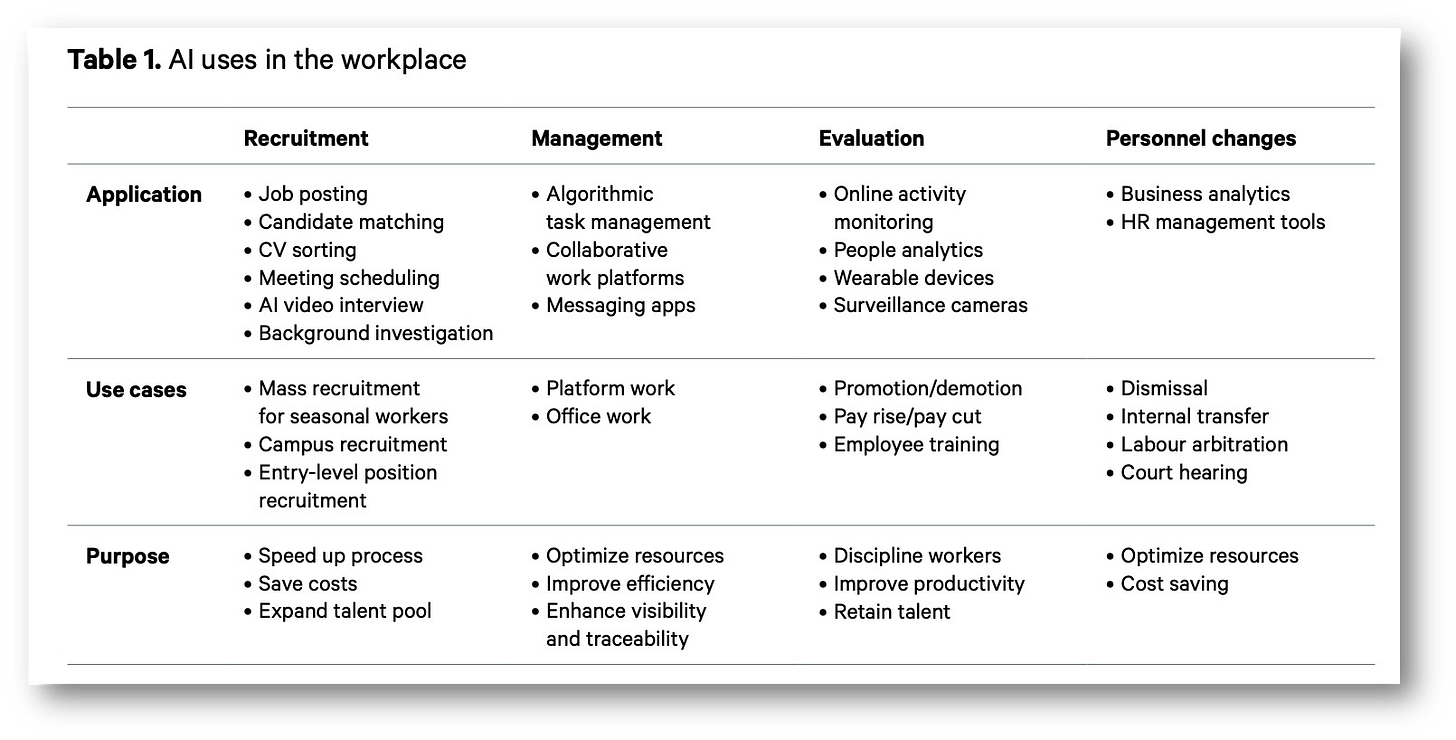AI in the Workplace: From Promise to Peril in China and The West
Using AI at work may not result in a workers' paradise
While the West argues about whose AI is smarter, companies in China have been applying AI in the workplace, and the results are anything but a workers’ paradise.
The early results of AI use in the workplace, as shown in this Chatham House report, show that our future AI-managed workplace may be more perilous than we’ve been told.
China’s greatest strength in the “AI Race” is its ability to implement technology; no other nation implements tech as fast, and AI is no different.
China’s speed comes from unique conditions, such as higher competitive pressure, the lack of rigid regulatory oversight, no labor unions, and an existing trove of data from advanced digitalization.
While these conditions don’t fully exist in the West, there are certainly close parallels with Uber and Amazon drivers, among many other jobs managed by algorithms.
The report points to an AI future less utopian than Silicon Valley has sold us.
👉TAKEAWAYS
🔹 AI integration in China’s workplaces is largely driven by market forces and competition, favoring business interests over those of workers. As a result, the balance of power in workplaces is shifting further towards employers who control data and algorithms.
🔹 Despite AI’s role in enhancing efficiency in the workplace, it has not led to improved job quality for Chinese workers. AI solutions tend to be designed for maximizing labour extraction.
🔹 Chinese workers report higher workloads and stress due to AI tools. The pressure to meet both human supervisors’ expectations and algorithmic metrics often translates into extended hours and more intense work.
🔹 The rapid introduction of AI in Chinese workplaces has outpaced the ability of workers to adapt, pressuring them to quickly learn new skills and putting those unable to keep up at risk of losing their jobs.
👊STRAIGHT TALK👊
We have all read bold proclamations that AI will empower workers, but what if the opposite is true, and AI further disempowers them?
I know that’s harsh, but we’ve already heard of the difficulty of working under the supervision of algorithms; why should AI be any different for the majority of workers?
Some readers will be tempted to say that the conditions in China won’t be repeated in the West. My answer is simple, what company will implement AI that does not favor its own business interests over those of the employee? None!
While AI will be revolutionary and useful for many high- and low-skilled jobs, it is also possible that by maximizing profits, it minimizes the humanity of labor.
In China, a similar problem with algorithms on the job led to groundbreaking laws supporting workers, I see them on the horizon for AI as well.
Now, before you tell me it can’t happen in the West, just read about Amazon delivery drivers peeing in bottles or accusations that the Uber algorithm cheats drivers.
I love AI, but the profit-optimizing ethos behind it scares me!
You too?
Join our community by subscribing. You’ll be joining an exciting journey down the rabbit hole to our shared digital future—you’ll be glad you did!
Subscribing is free, but I am honored by readers volunteering to opt for a paid subscription to recognize my high-quality writing. Thank you!
What’s in it for you if you subscribe?
Don’t get left behind: Get expert insight that focuses on Central Bank Digital Currencies (CBDC), AI, Payments, and Financial Inclusion, all delivered directly to your inbox weekly;
See the future: Profit from a unique point of view directly from Asia that focuses on how the region is “leapfrogging” the West and showing us the future.
Be independent: My message doesn’t follow corporate diktats it’s a message that’s often controversial and does not conform with mainstream outlets;
Prepare: CBDCs are no longer theoretical but coming soon, so keep up with the latest developments on the digital euro, yuan, sterling and dollar;
Understand: In-depth analysis of how our AI revolution impacts finance and will change how we interact with financial services.
Trust: My writing is trusted by over 50,000 executives, innovators, investors, policymakers, journalists, academics & open-minded crypto-holders daily!
Sponsor Cashless and reach a targeted audience of over 50,000 fintech and CBDC aficionados who would love to know more about what you do!







